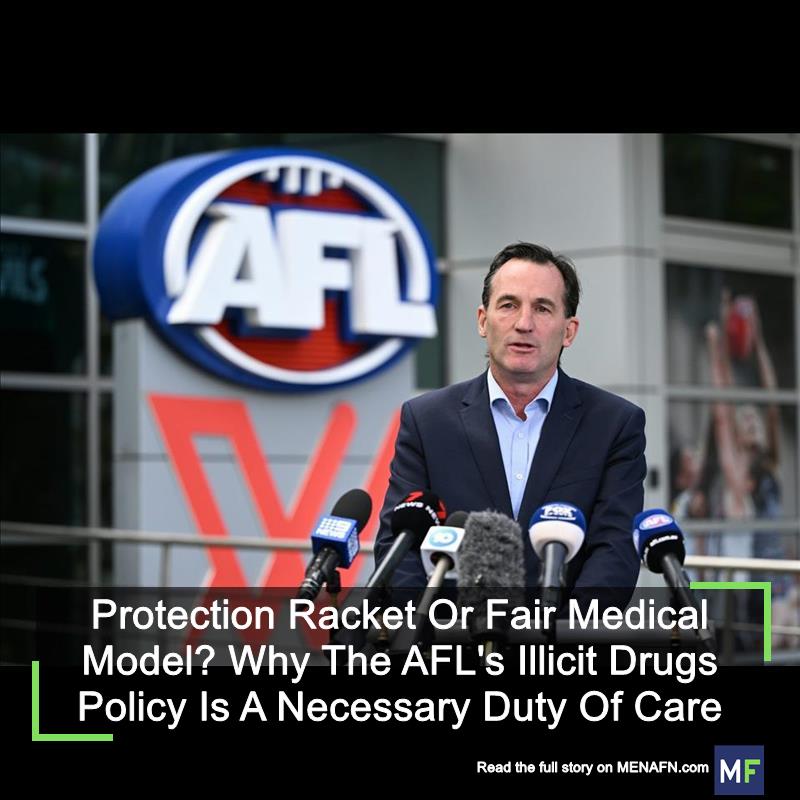
Protection Racket Or Fair Medical Model? Why The AFL's Illicit Drugs Policy Is A Necessary Duty Of Care
His comments created a media storm, largely because he inferred a nefarious cover-up.
However, Wilkie may not understand how and why Australian sports are pressured into taking a responsibility for protecting athletes, which the World Anti-Doping Agency (WADA) and Sports Integrity Australia (SIA) fail to do in regards to illicit drugs.
What is WADA's position on illicit drugs?Australia is a signatory to the WADA Code , which monitors performance integrity in respect of doping. This includes substances banned at all times, such as anabolic steroids and EPO , as well as substances banned only in competition, notably cannabis, heroin, ecstasy, and cocaine.
The latter are deemed “substances of abuse” and are associated with so-called recreational use in society.
Scientists do not consider these to be performance-enhancing – if anything they compromise exercise and endurance .
However, according to WADA, these drugs contravene two pillars (Section 4.3 ) of the anti-doping code: they are understood to be a“threat to athletes' health” and their use contrary to the“spirit of sport”.
Despite this position, WADA, and by extension SIA, does not monitor substances of abuse outside of competition; it is only interested in their use on match day.
Indeed, WADA's unwillingness to test for illicit substances out of competition (which it could do from the same urine sample that tests for performance-enhancing drugs) means sports are left to manage the risk of athletes engaging with substances of abuse and testing positive on match day.
The AFL's illicit drugs policy has come under fire in recent days. Why does the AFL have an illicit drug policy?
Since 2005, the AFL has operated an illicit drug policy with a core goal of monitoring substance abuse behaviour to minimise the risk of WADA's match-day violations.
To do so, it pays a drug testing company to act on its behalf and report back to the league, which then communicates with club doctors.
It is a medical model where drug addiction personnel work with players to try to change substance abuse behaviours .
With three“strikes”, the emphasis is on rehabilitation rather than punishment, though a player with a second or third strike will be named publicly, fined, and miss games.
The illicit drug policy is made possible because the AFL Players Association – like their equivalents in the NRL, cricket, and so on – have voluntarily consented to the process, provided it is driven by a medical model that protects players' privacy up to the second strike, at which point there are consequences for repeat misconduct.
However, the confidential, medical nature of the illicit drug policy has triggered many critics, who are eager to learn which athletes have a substance abuse problem, especially when such information can be used to trigger media eyeballs or political capital.
Read more: Venture capitalists are backing a 'steroid Olympics' to find out what happens when athletes are doped to the gills
Is the AFL's illicit drugs problem working?Has the illicit drug policy helped athletes with substance abuse issues avoid the risk of positive tests on match day?
All we have to work with are raw numbers. There are some 800 players in the AFL men's competition. In recent years, Sam Murray (Collingwood, 2018), Sam Gilbert (St Kilda, 2020) and Joel Smith (Melbourne, 2023) have been served with anti-doping violations for the presence of cocaine on match day.
Murray was given a four-year ban, but after appealing that the drug was not intended for match day, the penalty was reduced to 18 months.
Gilbert was not on the Saints' playing list at the time of the infringement, but copped a two-year ban to end his career. Murray never played in the AFL again. Smith's case is yet to be heard.
Can the AFL's illicit drugs policy be improved?A review into the policy is already been under way, but it seems unlikely the underlying foundation – a medical model – will change.
Just as importantly, the AFL's role in working with drug testers to identify players at risk – and suspend them from play when it's believed they could contravene anti-doping rules – is bound to continue.
However, the mechanism by which players are withdrawn from games might be finessed.
Athletes are unavailable for various reasons such as injury, illness, or personal circumstances.
The Wilkie speech to parliament suggested“faking” of injuries by players to“keep coaches in the dark” about why a player was unavailable for selection.
The AFL Doctors Association (AFLDA) disputed that claim, reiterating its commitment to truth and confidentiality in medical practice.
However, that still begs the question of what a player says to a coach about their inability to be available for selection. The AFLDA notes patients have the liberty to ask doctors to share information about their status and treatment with coaches, but without player permission, confidentiality remains.
Read more: What went wrong in Peter Bol's doping case? A sport integrity expert explains
A broader issue than just sportAccording to a 2023 federal government report , nearly three million Australians over the age of 14 years admitted to being lifetime users of cocaine, this making the country the highest per capita user of the drug in the world.
Given athletes are part of this culture of substance abuse, it is no wonder that the AFL, and other Australian sports, are trying, even if inelegantly, to manage the risk of WADA punishments from match-day violations.

Legal Disclaimer:
MENAFN provides the
information “as is” without warranty of any kind. We do not accept
any responsibility or liability for the accuracy, content, images,
videos, licenses, completeness, legality, or reliability of the information
contained in this article. If you have any complaints or copyright
issues related to this article, kindly contact the provider above.


















Comments
No comment